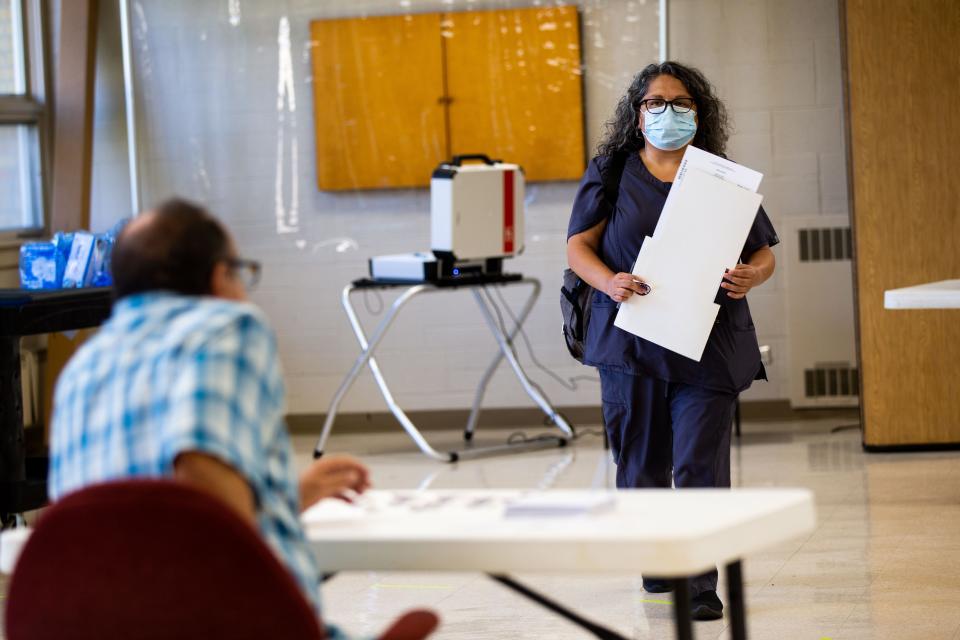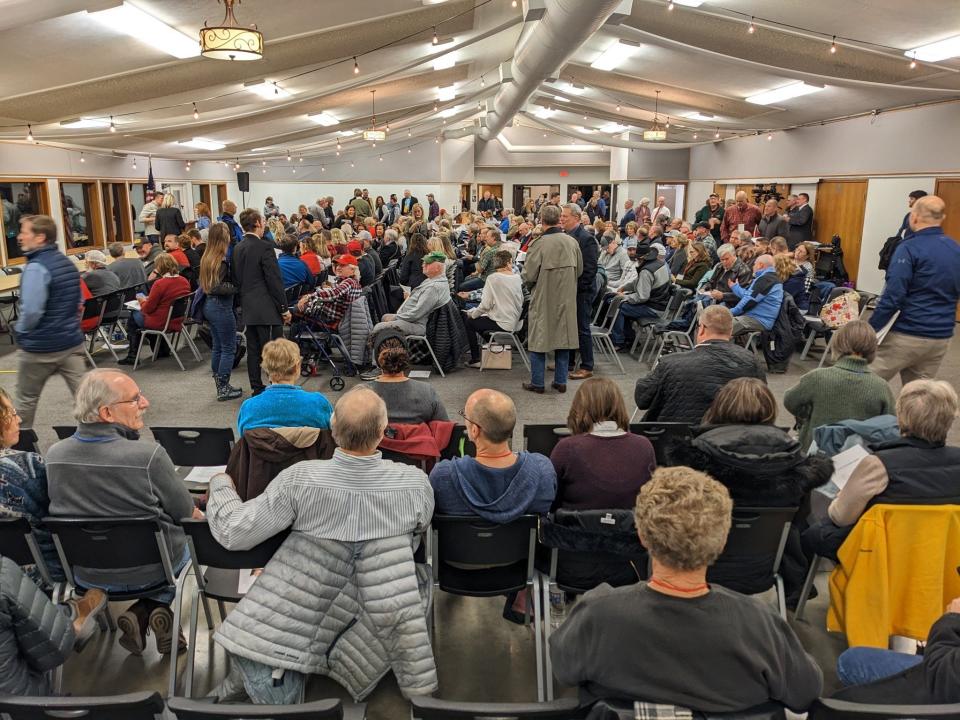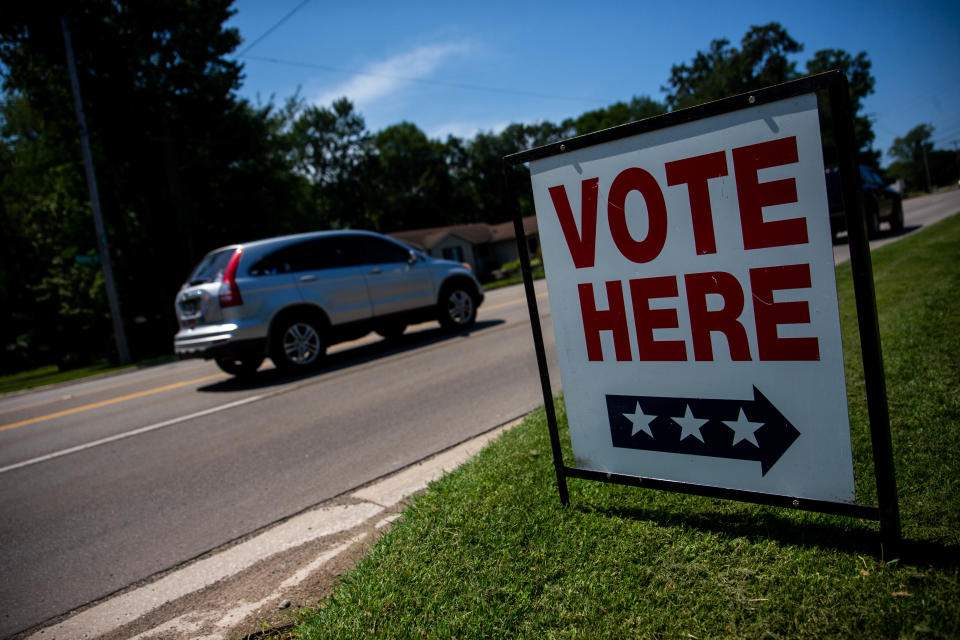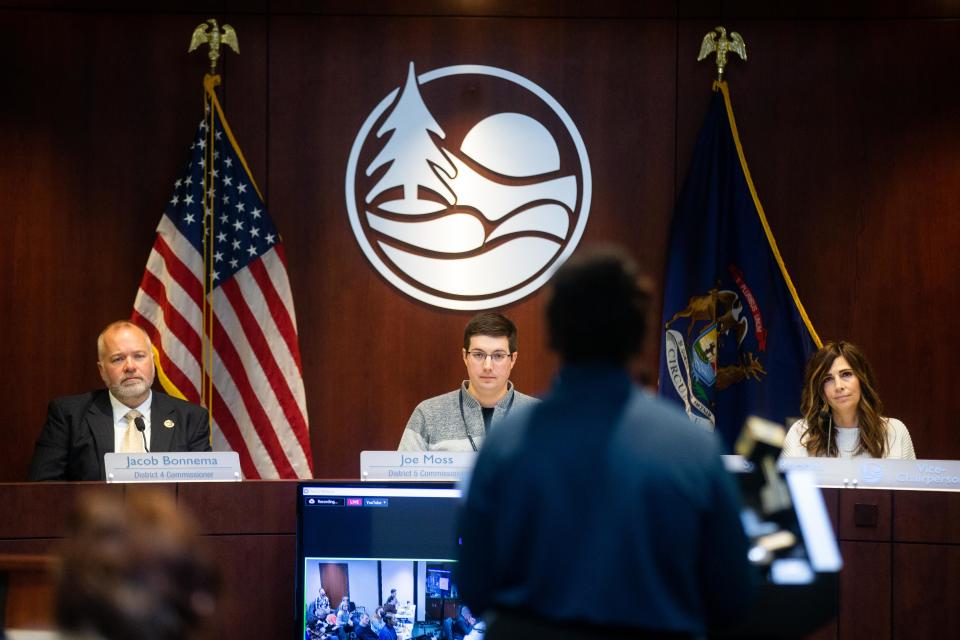Did the majority of Ottawa County support Ottawa Impact at the polls? The data says no
OTTAWA COUNTY — It’s been nearly three weeks since Ottawa Impact took West Michigan by storm, enacting several sweeping measures that caught residents by surprise.
The upstart far-right political group — borne from clashes over the county’s COVID-19 mitigation mandates in 2020 — unseated eight Republican incumbents on the county board, alleging the old guard wasn’t enforcing true conservative policies.
During its first board meeting Jan. 3, Ottawa Impact wasted no time, systematically adding several unannounced items to the agenda and voting on them, including firing the county’s administrator, selecting a different health officer than the previous board picked in December and firing its longtime legal counsel in favor of a conservative law group best known for challenging government mandates during the pandemic.
More:Court of Appeals upholds Ottawa County health officer's right to issue mask mandate
More:Public comment dominates Ottawa County board meeting after shake-up
Despite widespread criticism from the public, Ottawa Impact and its supporters are holding firm, saying a majority of voters put them into office and arguing they're simply delivering on their campaign promises.
“Elections have consequences,” one supporter said during public comment at the board's meeting Jan. 10.
“Thank you for listening to ‘We, the People,’” said another.
“The silent majority will be silent no more,” said a third.
But what is a voter mandate, and does Ottawa Impact actually have one?

What is a voter mandate?
A "mandate" suggests a political candidate was victorious because the public strongly supported their platform and wanted to see their policies enacted. A party often declares a mandate after a wave election, when a significant electoral shift gives one political party substantial gains in a legislative body, often resulting in a change of leadership.
A historical example in the U.S. would be after Franklin Delano Roosevelt won re-election by a landslide in 1936. Roosevelt carried every state except Maine and Vermont; that election remains the highest percentage of the electoral vote won by any candidate since 1820. He won by such a wide margin, Roosevelt felt confident the American people had given him the go-ahead to expand his New Deal policies.

Does Ottawa Impact have a mandate? The short answer is no, according to Whitt Kilburn, a professor of political science at Grand Valley State University.
“To have a voter mandate, you really need to have a candidate or an issue that can see broad support from both parties,” Kilburn said. “It can’t happen when there’s one party that is divided within itself, which is what we’re seeing in Ottawa County.”
For months, the Ottawa County Republican Party has shown signs of infighting between its staunch conservative members and the more traditional moderates.

Last spring, Keith den Hollander became chair of the Ottawa County GOP after former chair Rett DeBoer stepped down, citing internal issues within the party. In April, nine Ottawa Impact candidates, led by Hudsonville businessman Joe Moss, challenged all but one of the Republican incumbents on the Ottawa County Board of Commissioners.
In July, the GOP executive committee — still led by den Hollander — censured six of the Republican incumbents on the board for participating in voter forums hosted by nonpartisan local groups. The committee accused the commissioners of "publicly embracing Democrat interference in the Republican primary," a charge the incumbents vehemently denied.
All but one of the six who were censured lost to their Ottawa Impact challengers in the August primary, giving the group a de facto majority beginning in January. Moss is now chairman of the board.
By January, den Hollander was out as chair — despite seeking to retain the seat — and Joel Studebaker was named the county party leader.
More:Amid in-fighting, censures: What is the future for Ottawa County conservatism?
More:Ottawa County GOP selects Studebaker to lead local party
It’s a cannibalistic mentality that the conservative movement saw emerge with the rise of former President Donald Trump and which has now filtered into local governments, Kilburn said.
“It’s very much, you have to be in line with the ideology or you’re pushed out,” he said. “What we’re seeing is a proxy fight between the Trump wing of the party and the more traditional Republicans.”

What exactly was Ottawa Impact’s margin of victory?
Because Ottawa Impact targeted members of its own political party, the county commission candidates were able to oust eight of their moderate opponents in the August primary.
Only incumbent Republican Roger Bergman (District 10) prevailed over OI challenger Jenni Shepherd-Kelley; he went on to beat a Democratic opponent in November. The Ottawa County Board of Commissioners has traditionally been made up of mostly Republicans.
Voter turnout for August in Ottawa County was 34.3 percent, meaning of the 224,301 registered voters who were eligible to cast ballots, 66 percent of them didn’t vote.
More:Ottawa County board members ousted over handling of COVID-19 pandemic
Voting data also shows significant disparities between the number of ballots cast in each district and the number of voters who actually selected a candidate for their local commissioner race.
In the six contested races decided by default in August, where an Ottawa Impact candidate defeated a Republican incumbent with no challenger in the general, the districts (4, 5, 7, 8, 9 and 11) had a collective 111,610 registered voters, but only 42,570 (38.1 percent) of those people cast ballots, according to Ottawa County election data.
Of those who voted, even fewer made a selection as to who they wanted for county commissioner: 33,863 or an average of 30.3 percent across the six districts voted for their representative.
Of that, the Ottawa Impact candidates secured 21,680 votes, or an average of 19.4 percent of the combined registered voters in those districts.
In District 9, for example, the victory margin for now Commissioner Roger Belknap, who defeated incumbent Phil Kuyers, was only 307 votes, in a district that has 16,555 registered voters.
Even in the district with the widest margin of victory for an Ottawa Impact candidate during the primary, now Commissioner Moss defeated incumbent Randy Meppelink by 3,375 votes, but 12,930 people in that district, or 58.9 percent, didn’t cast a ballot.
Primary elections historically don't yield high voter turnout. In fact, the voter turnout in Ottawa County primaries for the past five even-numbered election years averaged only 28.4 percent, compared to 66.2 percent in the general elections.
Compared to general elections, researchers have found that sizable segments of voters consider the stakes lower and the costs of voting greater, feel less social pressure to turn out and hold exclusionary beliefs about who should participate — they're also more willing to defer to those who know and care more about the contests.
“The more local the race, the less people know who the candidates are,” said Kilburn, an expert in American politics, public opinion, elections and voting behavior. “That means only the most motivated people will vote, which tend to be the more extreme members of either political party.”

What if the OI board can’t achieve its goals?
“I'm really happy the people voted in change for Ottawa County — and I hope that we have delivered,” Moss told reporters after the Jan. 10 meeting. “And I hope we continue to do a really good job."
“Elections have consequences,” one public commenter said at that meeting. “All of you were put into place by your constituents. Every time a boat changes direction, it makes a wave."
Kilburn said he’s not surprised by that sentiment.
Subscribe:Get all your breaking news and unlimited access to our local coverage
“Elections have consequences — that’s a favorite phrase from conservatives and the Republican Party,” he said. “It gives more weight to it. But if you have to say you have a mandate, that, to me, is an obvious sign you don’t have one — when you’re trying to convince others.”
If the board finds impediments that are insurmountable — such as its authority to fire the county health officer — Kilburn said the OI commissioners will likely find a way to explain to their supporters that it’s not their fault.
“They will blame everyone else for their failure a la Trump,” he said. “That the system is conspiring against them — the deep state. It very much reads to me like the death throes of a movement that is waning.”
While the OI officials navigate their new roles, their decisions have motivated others to stop them.
On Sunday, Jan. 15, Vote Common Good: West Michigan announced it will join with Ottawa Integrity to launch and steer a new coalition called the Unifying Coalition of Ottawa County, which will serve to “channel all efforts related to the opposition of Ottawa Impact and the strategies to vote them out in 2024.”
More:Residents angered over Ottawa Impact policies form coalition to vote them out in 2024
Meanwhile, the political climate has inspired those who might not otherwise be involved.
"I guess I feel like I was asleep at the wheel," one Park Township resident said during the Jan. 10 public comment period.
I’m not concerned. I think the moderate conservatives in Ottawa county have come out of their slumber and realized they need to take action. Being passive is not going to work any longer. The left is certainly very loud. I’m confident the right is super large. Time will tell.
— Maddie ULTRAMAGA (b/c it triggers the left LOL!) (@Girl555Here) January 16, 2023
“I’m not concerned. I think the moderate conservatives in Ottawa County have come out of their slumber and realized they need to take action,” one Twitter commenter said. “Being passive is not going to work any longer.”
As to the moderates, their future role is yet undefined — but they could ultimately have a powerful role to play.
The moderates are not MAGA. They are far from pleased and the further right this group goes, the less support this group has. You’ve created quite an echo chamber, but that group is dwindling daily. (And the MiGop is dying) How do I know? I’ve one of millions that have left.
— Sheri Berends☮️ (@sberends1) January 16, 2023
“The moderates are not MAGA. They are far from pleased and the further right this group goes, the less support this group has,” a Twitter commenter said. “You’ve created quite an echo chamber, but that group is dwindling daily. (And the MiGop is dying) How do I know? I'm one of millions that have left.”
— Sarah Leach is editor of The Holland Sentinel. Contact her at sarahleach@hollandsentinel.com. Find her on Twitter @SentinelLeach.
Races decided in the August primary:Registered voters in Ottawa County: 224,301Total average turnout: 34.3%DISTRICT 4Number of registered voters: 21,327Number of people who voted: 7,342Number of people who voted in commission race: 5,957Voter turnout: 34.4%Commission voter turnout: 27.9%DISTRICT 5Number of registered voters: 19,959Number of people who voted: 8,194Number of people who voted in commission race: 7,029Voter turnout: 41.1%Commission voter turnout: 35.2%DISTRICT 7Number of registered voters: 19,600Number of people who voted: 7,085Number of people who voted in commission race: 5,398Voter turnout: 36.1%Commission voter turnout: 27.5%DISTRICT 8Number of registered voters: 13,496Number of people who voted: 4,306Number of people who voted in commission race: 3,644Voter turnout: 31.9%Commission voter turnout: 27.0%DISTRICT 9Number of registered voters: 16,555Number of people who voted: 8,050Number of people who voted in commission race: 5,747Voter turnout: 48.6%Commission voter turnout: 34.7%DISTRICT 11Number of registered voters: 20,673Number of people who voted: 7,593Number of people who voted in commission race: 6,088Voter turnout: 36.7%Commission voter turnout: 29.4%
This article originally appeared on The Holland Sentinel: Did the majority of Ottawa County support Ottawa Impact at the polls? The data says no

